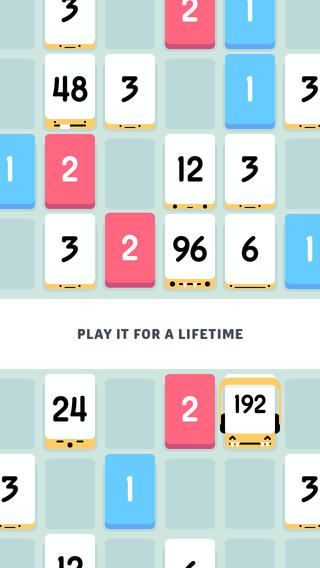Like most other people in my clique, I have been playing 2048. Now, I don't really spend a lot of time playing games but this is different, and I'll tell you why.
For context, a few days ago, this letter from the developers of Threes started floating around, calling this game a cheap clone. They went to describe how hard they had worked and how this game does not meet the same standards as Threes.
Yet, everyone I know has been playing this game and not Threes. Why?
Threes is too hard
About half of the world has an IQ of 100. Deliberately designing a game that is super-difficult implies that you intend to appeal to a narrow audience. In contrast, 2048 is fun for everyone. It has the right difficulty level and you get intermediate rewards more often. The tiles collapse by themselves most of the time, so even passive strategies have rewards. This is a game you'd be comfortable playing in the midst of cognitive noise - like on the bus while listening to music. Yet, for those who want a challenge, by sheer principles of math, the game gets exponentially harder.
2048 has goals
2048 has a long term goal - getting to 2048 - and short term goals - getting to all the other powers of two. That gives it a certain velocity that Threes is lacking. In Threes, the long term goal is getting to ... infinity? That doesn't really inspire one to just push through and get to the finish line.
2048 works across platforms
Threes is an Android/iPhone app. 2048 can be played in any browser on phone, tablet or desktop. In a non-perfect world where there are different OSes on different devices, this not only means that 2048 is accessible to more people, it is also accessible to the same person on different devices. Even then, a big advantage of open sourcing the game is that if there's a hole to fill, anyone can do it.
2048 engages muscle memory
Okay, so, yes, if you mindlessly hit up/left arrow keys in succession, the game doesn't realize it's being outsmarted. That's not so bad. Especially if you are not so good at math - you can go longer without crashing into something and that feels kinda good. With Threes, you can't really do that - every move has to be well-thought out. Ain't nobody got time for that.
2048 is designed simpler not harder
Threes is, no doubt, designed by the book, but the differences between the games and their executions, reinforce the idea of Occam's Razor - find simplicity. 2048 has no sound effects or jarring animations - this means that they don't slow down the game or run the risk of getting repetitive. That makes it perfect for over-consumption, which is what helps something become viral. The palette is subdued and yet, there's a feeling that the game is alive. "I worked harder, so mine is better" is never quite convincing, is it?
The game appeals to me personally on the following accounts:
I do math in 2s.
My entire life revolves around math in powers of 2. If you asked me what came after 32, I'd probably say 64. I don't think this is specific to CS people though - binary classifications are everywhere in nature, and people in all fields have to deal with them. In contrast, three is not such a friendly number. Threes also has 1s and 2s, which add more complexity to the game and keep it from being succinct.
I see moving geometric patterns all the time.
My idle brain is always moving tiny objects around it. It absolutely loves it when symmetric patterns collide, like the tiles on the bathroom floor or the scales on blinds. This game greatly satisfies that need (I've been having headaches from playing too much, but that's my problem).
And here's a screenshot of my highest score so far:


